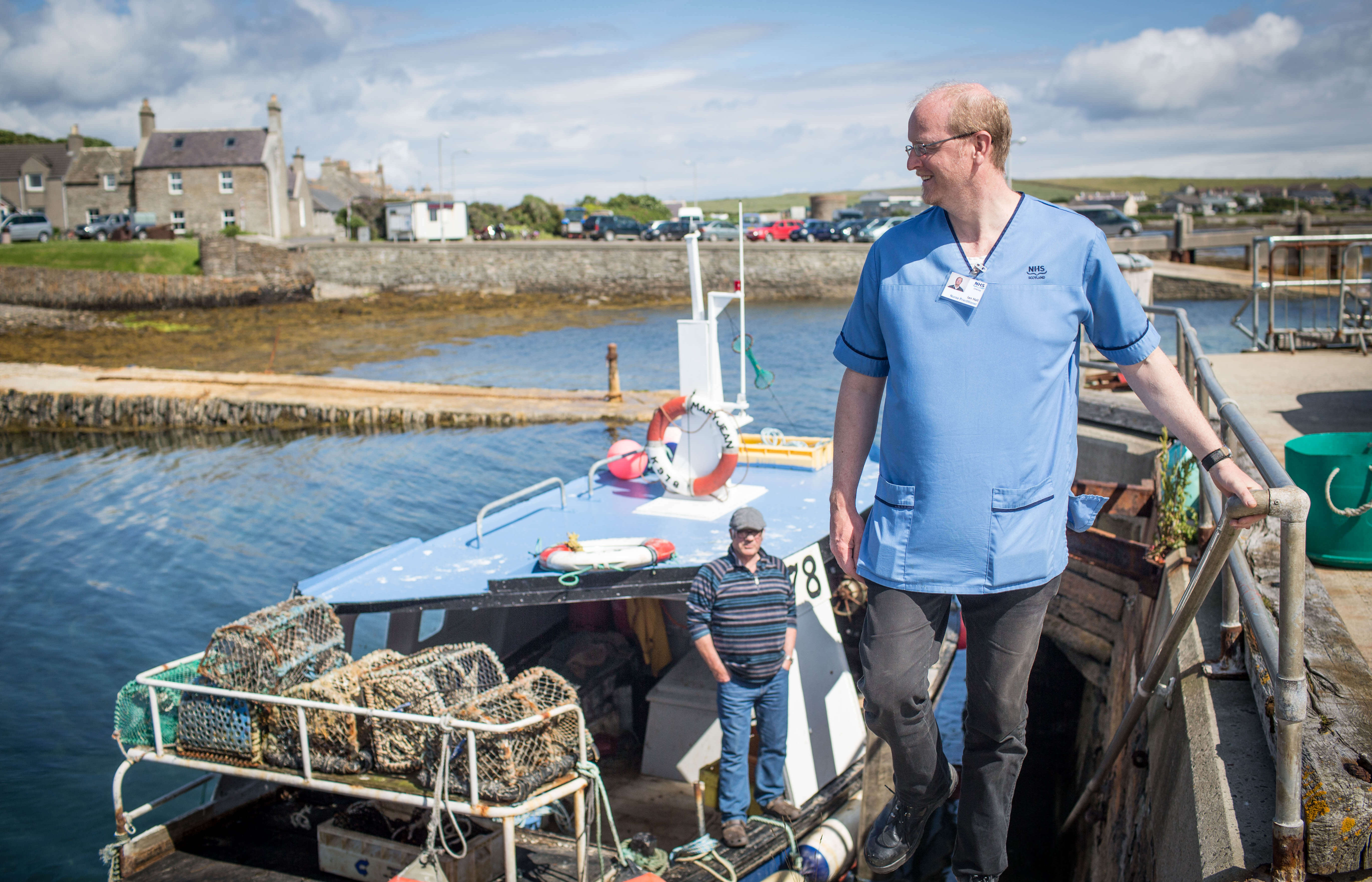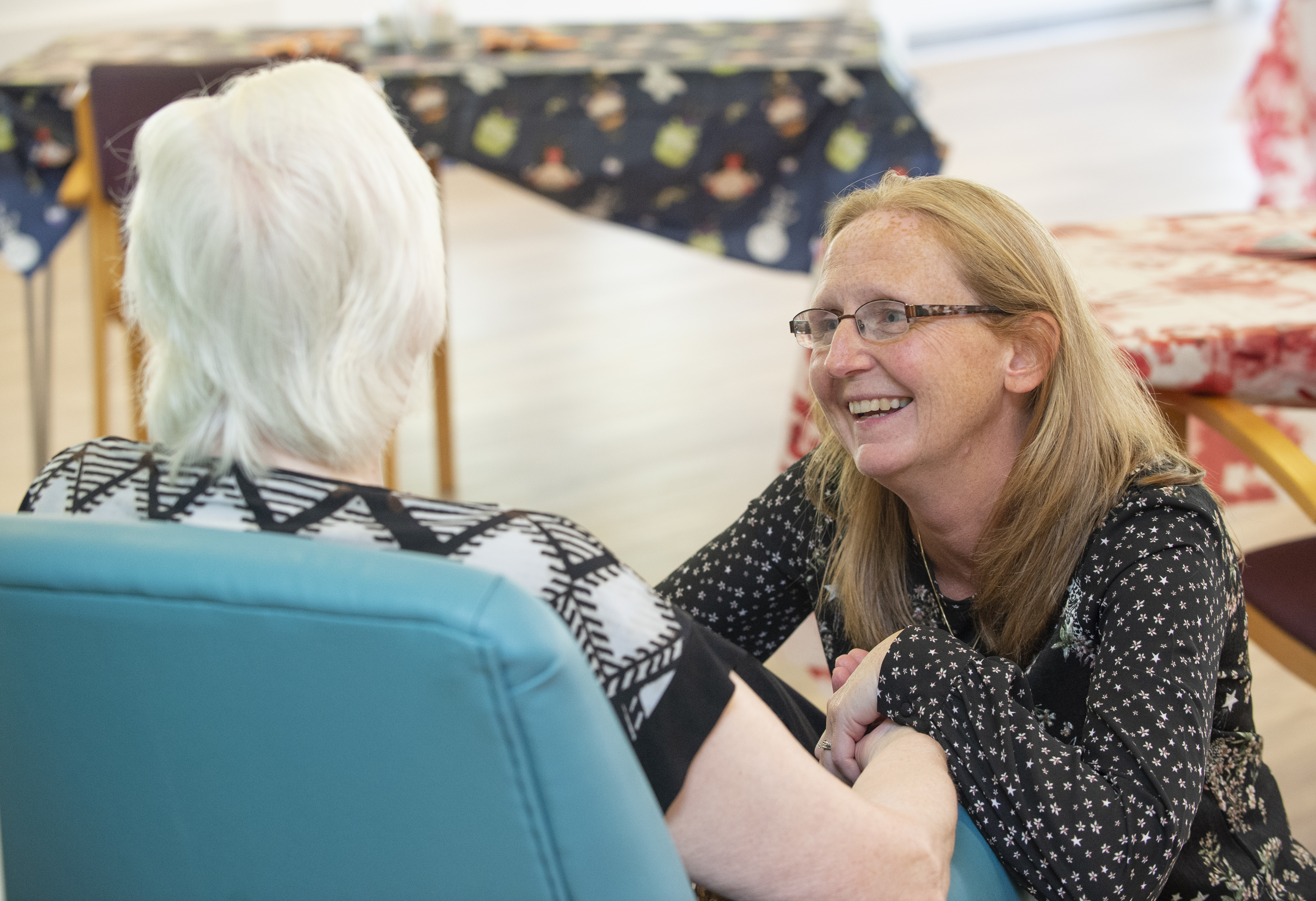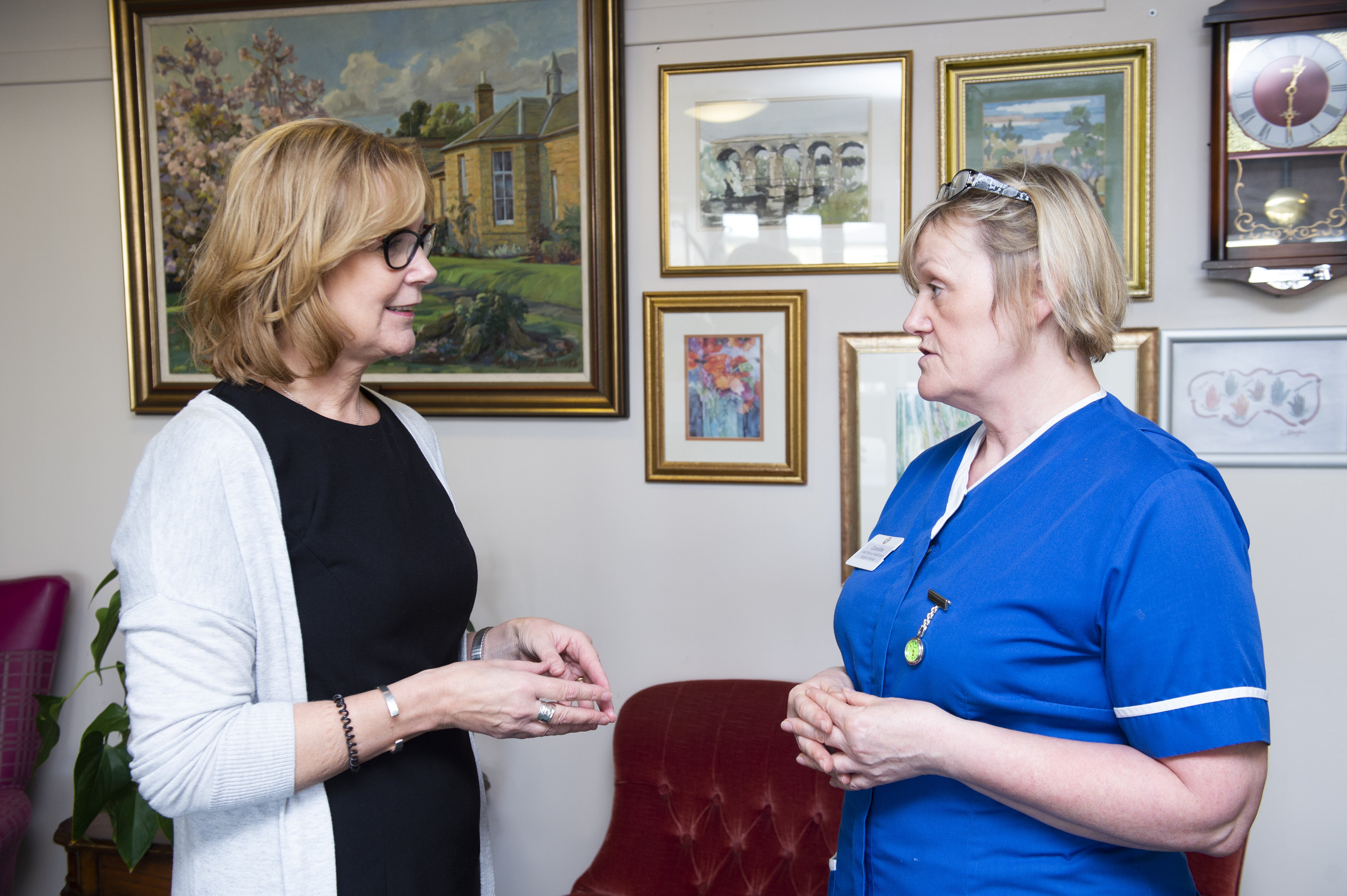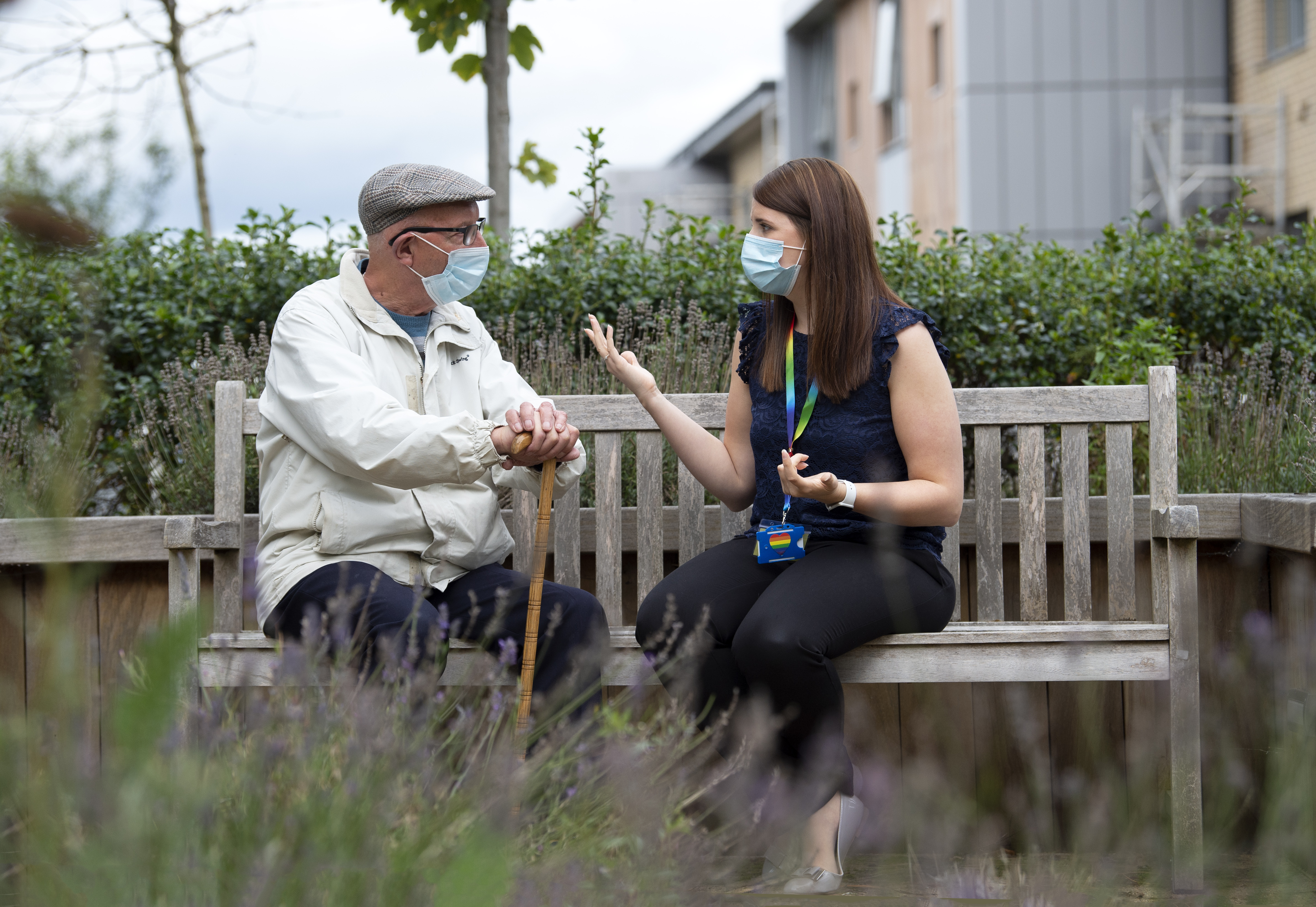
Care home/social care nurse
Care home and adult social care nurses know that care homes are people’s homes as well as places of care. They manage complex multi-morbidities and frailty, and they promote anticipatory care as well as supporting people to live as independently as possible. Care home and adult social care nurses work closely with people’s families to enable advanced care planning, and ensure people have access to sensitive palliative and end of life care.

Lesley Wylie
Lesley is the manager of a dementia specialist home run by the charity Erskine, who have been caring for Scotland’s veterans since 1916. Proud of the relationship-centred culture within the Erskine Park Home, Lesley is motivated to promote care home nursing role as an innovative and developing area of practice.
I started off doing a physics and instrumentation degree – but I got married and moved down south before I completed it. The first job I got there was as a care assistant in a care home, and I absolutely loved it – I was really drawn by the deep relationships you quickly formed with the people you cared for. So, I applied to do my nurse training, still working in the care home while doing so.
After qualifying, I worked in oncology and neurology wards briefly, but I really missed the long-term relationships which you have working in residential care. So, I moved into care home nursing in 2001, and for the last ten years have been working with Erskine. It is a very forward-thinking organisation, Erskine was the first care home environment in Scotland to employ an Advanced Nurse Practitioner and a Dementia Nurse Consultant and, the nurses here are really encouraged and supported to develop their practice.
I can’t imagine working anywhere other than in a care home – I just wouldn’t get the same joy and fulfilment out of my job. I am lucky because not only is this a care home, but we are caring for veterans, so for me, you’re ticking two boxes. I have a real passion for caring for our veterans – it is something I really believe in.
I am responsible for all aspects of the day-to-day operations of the home of 40 residents and driving forward quality and standards in the home.
My role includes the training and supervision of around 80 staff. I have an open-door policy across the home and like to be a visible leader to staff and residents, I like to be involved. Creating a team where everyone supports each other is important to creating an atmosphere in the care home which feels safe and comfortable. It also provides an atmosphere where change is embraced and not only embraced but encouraged so we are constantly improving the care provided to those living here.
In care home nursing, your drive is to make people’s life worthwhile and meaningful – nothing is too small. Residents can come to my office when they want to. There is one lady who will sit in my office for hours with her colouring books and she’s no longer distressed when she’s doing that.
I also liaise with families, staff and external agencies to actively promote independence for residents and ensure the delivery of quality relationship-centred care. I’m a driven leader always looking for new and innovative practices that are positive for the residents living in the home and develop the staff.
To see people living with dementia, who had to give up their home to come into a new environment and watching them feel safe and secure here and grow to have a positive home life is probably the main driver for me. I see my role as a community nurse as ensuring people who are living with dementia are fulfilled and making every moment count in the life they are leading.
Forming trusting relationships is key in doing that – you need the ability to develop strong relationships, be that with the residents, their relatives or your team.
Absolutely everything I do is about making sure that when the residents leave their homes, they are moving into somewhere that will continue to feel like their own home. It is making sure when they come in here that it doesn’t feel clinical.

Jane Douglas
I am Chief Executive of a registered charity that has three care homes and around 125 staff. We have one care home with 32 residents, a care home aimed at supporting people living with dementia, with 18 rooms, and a nine-room care home for people with physical disabilities and cognitive disabilities. We also have a resource centre, where people living with dementia in the community can come together.
I have always wanted to be a nurse ever since I was a child. I don’t know where the determination came from, but I never faltered from it – all through school, I was focused on fulfilling that dream. When I first qualified, I worked in acute surgical and medicine, and I went to Jersey in the Channels Islands for five years. When I came back to the mainland, I started working in a care home and really enjoyed it – it was a lot of responsibility, I had to make my own decisions, it was a much more homely atmosphere and lovely environment to work in. From that post, I went to be a care home manager in a residential care home and that was my first experience of managing a team of nurses and staff. I held various other posts before I was lucky enough to get my current job. I love where I am now – I am where I am meant to be.
Nobody wants to leave their house, but if we have our home life disrupted and we move somewhere then I would want them to come here and feel like this is just as good. We know that we can never replace somebody’s home, but we would want them to enjoy the time they have with us in a way that provides a quality of life. For me, it is important to promote individual choice, to help each person to make their own decisions, no matter how little that decision is. It’s about making a difference to the person’s day and being very real and authentic, not everyone is going to be happy all the time, but we just keep trying and it’s about not giving up on somebody. My aim is that people experience life in a care home positively, that they have a voice, and they are able to be autonomous as much as they can be. By doing this and listening hard to what people prefer, I hope we are able to achieve wellbeing. When people feel listened to, they know we are doing the things they want rather than what we think they want. For me, the impact is all about every person being happy as much as they can be and being supported in a way they want to be cared for.
A real skill is being able to see something from where the other person is coming from – a resident, a family member, or staff in the care home. Why are they feeling the way they feel? In my role I am using all the skills of nursing. Every time I go into a room I’m using my assessment skills, understanding the social and psychological needs as well as the physical. It’s also about drawing on all the different skills as a leader, as a manager. Making sure I have the right people at the right time, making sure I am a good trainer, that I am developing my staff and promoting positivity. I have the budget responsibility as well – but balancing all that it is about ensuring the people who live here come first. I am a nurse first and foremost but also the manager and director of the service. I bring a wide skillset to ensuring that we provide a truly homely setting for people to live well and is the best it can possibly be.

Nicola Dow
I have always worked in care homes having originally joined as a part-time carer after school when I was a teenager. At university I firmly decided hospital wasn’t for me, as I missed the sense of connection you get in a community setting. Some of the people I meet have gone through wars or financial collapse, getting to know them makes more of a difference to me and them. Each person I meet feels like I’m gaining another family member. Things are happening all the time and seeing someone’s journey alongside their family, friends, and the way they interact with other people in the care home is really rewarding.
My mission is to spread my own knowledge across the team, especially around visual impairment. I want to reach out to other services and educate people about visual impairment for people who may have less experience. My big task is to reach out to others – equip them with the best knowledge.
I want to care for each person as an individual and for their family. One family member said to the Care Inspectorate that bringing mum here saved her life. So many loved ones are dealing with guilt ‘I promised I wouldn’t put them in a care home’ and we work hard to help them adjust and accept that they have done enough and have not failed. We enable people to fulfil their potential; one resident came in and she couldn’t walk any more. After a few weeks, she came downstairs in the lift and walked independently with her walker to my office to say hello. We have an activities team and because our residents are visually impaired, we focus on touch, and tactile care. We use paints by feeling. The residents have created bird houses and wells. One of our residents who can only see shadows, says he feels like a man again.
I strive to make this a social environment, enabling people to enjoy each other’s company. I encourage family to stay and have a meal, or they go to the pub and have lunch. A care home is home, and I want friends and family to feel welcome.
I work closely with the Health and Social Care partnership, and I participate in multi-agency case conferences. We are a part of the local community, and I link into as many networks as possible as there are great resources to tap into.
The photography for this interview was taken when COVID restrictions were in place, all relevant guidelines and restrictions were observed.